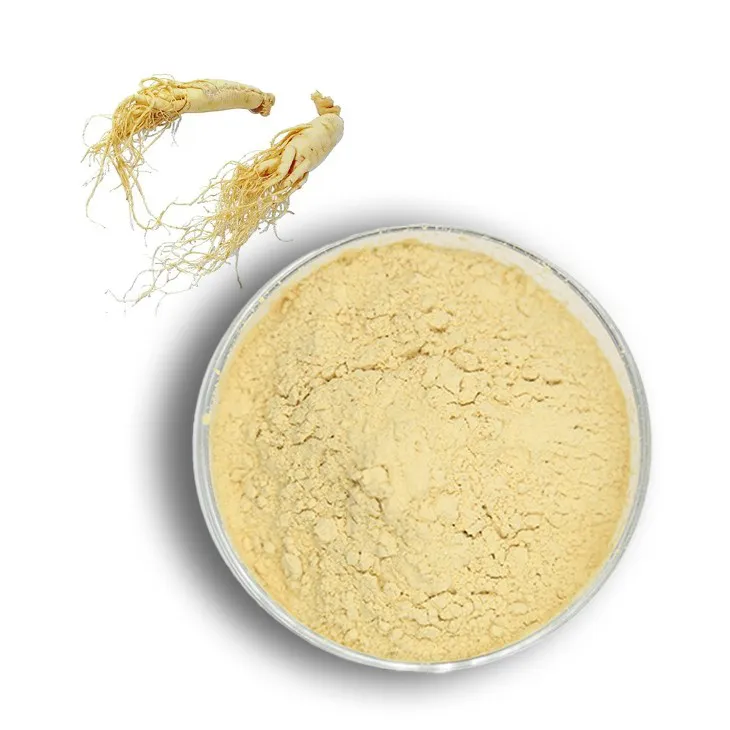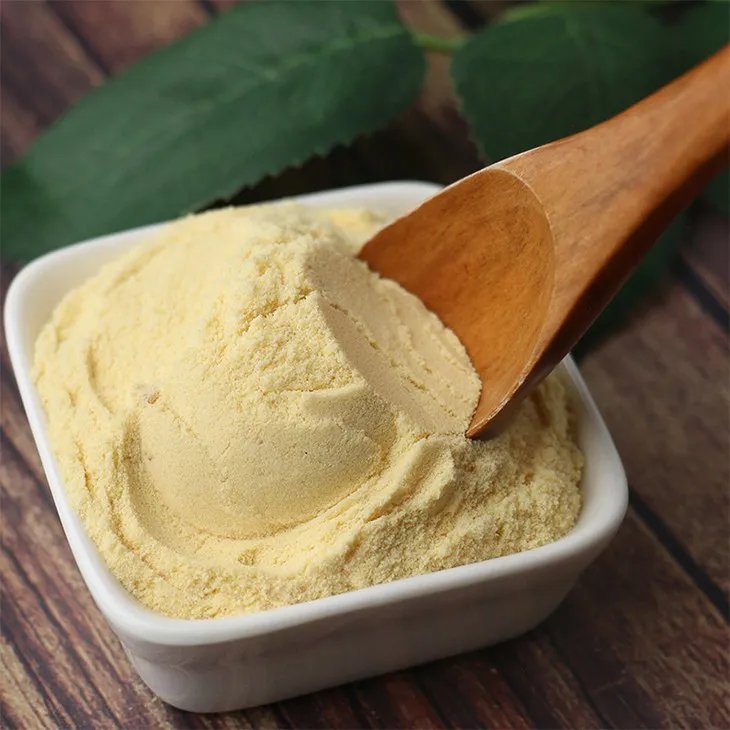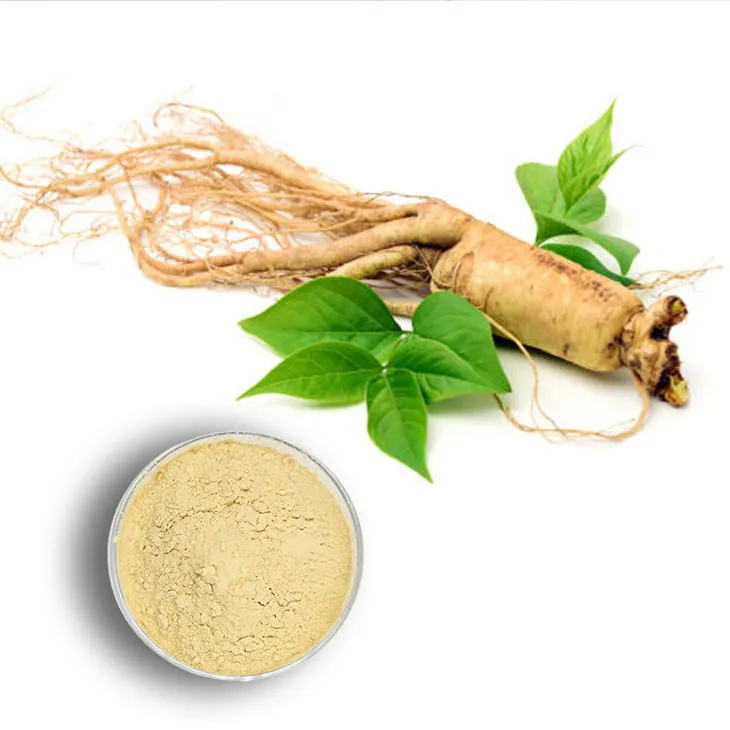- 0086-571-85302990
- sales@greenskybio.com
Optimal Bioavailability of Ginseng Root Extract.
2024-11-30

1. Introduction
Ginseng Root Extract has been renowned for its numerous health benefits in traditional medicine systems across the world. However, the full realization of these benefits depends on its bioavailability, which is the proportion of an administered substance that reaches the systemic circulation and is thus available at the site of action. Understanding the factors that influence the bioavailability of Ginseng Root Extract is crucial for maximizing its potential health - promoting effects.

2. The Impact of Diet on Bioavailability
2.1 Food - Ginseng Interactions
When considering the bioavailability of Ginseng Root Extract, diet plays a significant role. Some foods can enhance or inhibit the absorption of ginseng components. For example, consuming ginseng root extract with a high - fat meal may affect its absorption. Fatty acids can interact with the lipophilic components of ginseng, potentially altering their solubility and thus their absorption rate. On the other hand, certain dietary fibers may slow down the digestive process, which could influence the release and absorption of ginseng compounds.
2.2 Nutrient Combinations
- The presence of certain vitamins and minerals in the diet can also impact ginseng bioavailability. For instance, vitamin C is known to have antioxidant properties. When consumed together with ginseng root extract, it may protect the bioactive compounds of ginseng from oxidative degradation, thereby enhancing their bioavailability.
- Calcium, a common mineral in the diet, may form complexes with ginseng components. This complex formation can either increase or decrease the solubility of ginseng compounds, depending on the specific chemical nature of the interaction. If the complex is more soluble, it may lead to improved absorption; otherwise, it could hinder absorption.

3. The Role of Gut Microbiota in Bioavailability
3.1 Microbiota - Ginseng Metabolism
The gut microbiota has emerged as a key player in determining the bioavailability of ginseng root extract. These microorganisms can metabolize ginseng compounds in ways that may increase or decrease their bioactive forms. For example, some bacteria in the gut can hydrolyze ginsenosides, the major bioactive components of ginseng, into more bioavailable metabolites. This metabolic transformation can enhance the absorption and subsequent biological activity of ginseng - derived substances.
3.2 Microbiota Diversity and Bioavailability
- The diversity of gut microbiota is also important. A more diverse gut microbiota is generally associated with a greater ability to metabolize ginseng compounds effectively. In individuals with a less diverse microbiota, the bioavailability of ginseng root extract may be suboptimal. This is because a limited range of microbial species may not be able to perform all the necessary metabolic conversions required for maximizing the bioactive potential of ginseng.
- Furthermore, factors such as diet, antibiotic use, and lifestyle can influence gut microbiota diversity. A diet rich in fruits, vegetables, and fermented foods can promote a diverse gut microbiota, which in turn can positively impact the bioavailability of ginseng root extract.

4. Modern Extraction Techniques and Bioavailability
4.1 Conventional vs. Modern Extraction
Traditional extraction methods for ginseng root extract may not always yield the highest bioavailability. Modern extraction techniques, on the other hand, are designed to optimize the extraction of bioactive compounds while also enhancing their bioavailability. For example, supercritical fluid extraction (SFE) uses carbon dioxide under supercritical conditions to extract ginseng components. This method can selectively extract the desired bioactive compounds while leaving behind unwanted substances, resulting in a more pure and potentially more bioavailable extract.
4.2 Nanotechnology - based Extraction
- Nanotechnology - based extraction and delivery systems are also being explored for ginseng root extract. Nanoparticles can be engineered to encapsulate ginseng compounds, protecting them from degradation and facilitating their absorption. These nanoparticles can be designed to target specific cells or tissues, increasing the local concentration of ginseng - derived bioactive substances and thus enhancing their bioactivity.
- For example, liposomal nanoparticles can encapsulate ginsenosides, improving their solubility in aqueous environments. This enhanced solubility can lead to better absorption across the intestinal barrier, ultimately increasing the bioavailability of ginseng root extract.

5. Strategies to Improve Bioavailability
5.1 Dietary Considerations
Based on the understanding of the impact of diet on ginseng bioavailability, certain dietary strategies can be employed. Consuming ginseng root extract with foods that are known to enhance its absorption, such as those rich in vitamin C, can be beneficial. Additionally, avoiding high - fat meals or those containing substances that may form complexes with ginseng components can help optimize bioavailability.
5.2 Probiotics and Prebiotics
- Given the role of gut microbiota in ginseng bioavailability, the use of probiotics and prebiotics can be a viable strategy. Probiotics are live microorganisms that, when consumed in adequate amounts, confer health benefits. By introducing beneficial bacteria into the gut, probiotics can potentially enhance the metabolism of ginseng compounds. For example, certain strains of lactobacilli and bifidobacteria have been shown to have positive effects on ginseng metabolism.
- Prebiotics, which are non - digestible food ingredients that stimulate the growth and activity of beneficial gut bacteria, can also be used. Foods such as chicory root, which is rich in inulin (a prebiotic), can be included in the diet to promote a gut microbiota that is favorable for ginseng bioavailability.
5.3 Optimizing Extraction and Delivery
The continued development and use of modern extraction techniques, such as SFE and nanotechnology - based methods, can further improve the bioavailability of ginseng root extract. Pharmaceutical companies and researchers should focus on optimizing these techniques to ensure that the final product contains the highest amount of bioactive and bioavailable ginseng components.

6. Conclusion
In conclusion, achieving optimal bioavailability of ginseng root extract is a complex process that involves multiple factors. Diet, gut microbiota, and extraction techniques all play crucial roles in determining how much of the beneficial ginseng compounds are actually available for the body to utilize. By understanding these factors and implementing appropriate strategies, such as dietary modifications, probiotic and prebiotic use, and the adoption of modern extraction and delivery methods, we can maximize the health benefits associated with ginseng root extract. Future research should continue to explore these areas in more detail to further enhance our understanding and utilization of this valuable natural product.
FAQ:
Question 1: How does diet affect the bioavailability of ginseng root extract?
Diet can have a significant impact on the bioavailability of ginseng root extract. For example, consuming certain foods high in fat may enhance the absorption of fat - soluble components in ginseng. On the other hand, some dietary fibers might slow down the absorption process. Also, the presence of other bioactive compounds in the diet could interact with ginseng components, either positively or negatively influencing their bioavailability.
Question 2: What role does gut microbiota play in the bioavailability of ginseng root extract?
The gut microbiota can metabolize ginseng root extract. Some bacteria in the gut can break down complex components of ginseng into more easily absorbable forms. They may also influence the transport of these components across the intestinal wall. A healthy and diverse gut microbiota is likely to contribute to better bioavailability of ginseng root extract compared to an imbalanced microbiota.
Question 3: How do modern extraction techniques improve the bioavailability of ginseng root extract?
Modern extraction techniques can target specific components of ginseng more effectively. For instance, advanced extraction methods can isolate and purify the active ingredients, reducing the presence of interfering substances. These techniques can also produce extracts in forms that are more readily soluble and absorbable in the body, thus enhancing the bioavailability of ginseng root extract.
Question 4: Are there any specific components in ginseng root extract that are more affected by bioavailability factors?
Yes, certain components such as ginsenosides are of particular interest. Their bioavailability can be highly influenced by factors like diet, gut microbiota, and extraction techniques. Ginsenosides are important for the health benefits of ginseng, and any changes in their bioavailability can significantly impact the overall effectiveness of ginseng root extract.
Question 5: Can lifestyle factors other than diet affect the bioavailability of ginseng root extract?
Yes, lifestyle factors such as exercise and smoking can also affect it. Regular exercise may enhance blood circulation, which could potentially improve the distribution and absorption of ginseng root extract in the body. Smoking, on the other hand, may introduce harmful substances that could interfere with the normal absorption and metabolism of ginseng components.
Related literature
- Bioavailability of Ginseng and Its Health Benefits"
- "The Influence of Gut Microbiota on Ginseng Efficacy"
- "Modern Extraction Techniques for Optimizing Ginseng Bioactive Compounds"
- ▶ Hesperidin
- ▶ citrus bioflavonoids
- ▶ plant extract
- ▶ lycopene
- ▶ Diosmin
- ▶ Grape seed extract
- ▶ Sea buckthorn Juice Powder
- ▶ Beetroot powder
- ▶ Hops Extract
- ▶ Artichoke Extract
- ▶ Reishi mushroom extract
- ▶ Astaxanthin
- ▶ Green Tea Extract
- ▶ Curcumin Extract
- ▶ Horse Chestnut Extract
- ▶ Other Problems
- ▶ Boswellia Serrata Extract
- ▶ Resveratrol Extract
- ▶ Marigold Extract
- ▶ Grape Leaf Extract
- ▶ blog3
- ▶ blog4
-
The best lemon juice powder in nature.
2024-11-30
-
Organic Vitamin K2 Powder Suppliers
2024-11-30
-
Bulk purchase of L - tyrosine.
2024-11-30
-
Vitamin K2 Manufacturers
2024-11-30
-
100% Pure Natural Rutin.
2024-11-30
-
Chinese Citrus Bioflavonoid Suppliers.
2024-11-30
-
melatonin extract
2024-11-30
-
Boswellia Serrata Extract
2024-11-30
-
Lotus leaf extract
2024-11-30
-
Saponin Extract
2024-11-30
-
Elderberry Extract
2024-11-30
-
Grape Seed Extract
2024-11-30
-
Cactus Extract
2024-11-30
-
Genistein
2024-11-30
-
Saffron Extract Powder
2024-11-30
-
Giant Knotweed Extract
2024-11-30





















